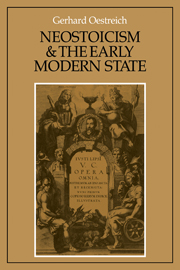Foreword
Published online by Cambridge University Press: 04 May 2010
Summary
In 1976, the editors of the series Cambridge Studies in Early Modern History suggested to Gerhard Oestreich the publication of an English version of his collection of essays, Geist und Gestalt des frühmodernen Staates. At first it was thought that only relatively minor changes would be needed, notably the substitution of some more recent essays of wider interest for two of the highly specialized and technical articles. These substitutions have become chapters 92 and 103 in this book. Oestreich, however, decided on a complete recasting of the first four chapters, those concerned most directly with Lipsius, Neostoicism and the Netherlands movement. At the time of his premature death, in 1978, he had not fully completed this task and would undoubtedly have wished to make some emendations, especially to the second half of the rewritten text. Nevertheless, we thought that the last draft was sufficiently close to Oestreich's intention to represent fairly his last rethinking and reformulation of his subject. The final German text of these chapters (1–7) which was then used for the present translation was prepared by Brigitta Oestreich. The remaining chapters are essays translated substantially from the form in which they appeared originally, from 1953 onwards, and in which they were then republished in Geist und Gestalt des frühmodernen Staates.
Neostoicism was a movement which has been known to historians in this country mainly in its French literary and philosophical form.
- Type
- Chapter
- Information
- Neostoicism and the Early Modern State , pp. vii - viiiPublisher: Cambridge University PressPrint publication year: 1982



